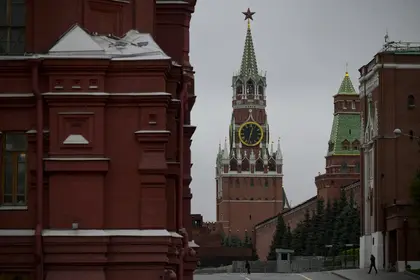A pro-Kremlin grandson of French war hero and president Charles de Gaulle has caused unease by visiting Russia to attend official commemorations and meet the head of the foreign intelligence service.
Pierre de Gaulle, the youngest grandson of the founder of the France’s modern republic, visited Moscow this week before travelling to Volgograd on Thursday for WWII commemorations attended by Russian leader Vladimir Putin.
JOIN US ON TELEGRAM
Follow our coverage of the war on the @Kyivpost_official.
This is not the first time the previously little-known scion of France’s most famous political family has made waves.
Last month he earned a family rebuke over a high-profile interview in which he repeated Russian justifications for invading Ukraine.
On Tuesday, Russia’s state television showed him taking part in a roundtable with the head of Russia’s SVR foreign intelligence service, Sergei Naryshkin.
“The decision of the West to send heavy tanks to the front (in Ukraine) is very dangerous. Western politicians do not understand that,” de Gaulle says according to comments translated into Russian.
Naryshkin can be heard praising “respected Mr de Gaulle” and thanking him for his “principled and firm position, standing up for true European and human principles”.
A Twitter account from the Russian foreign ministry in Rostov-on-Don published a picture of de Gaulle in Volgograd on Thursday, where he gave an interview to a local TV channel, Volgograd 24, according to images viewed by AFP.

Loopholes, Lax Enforcement Fuel Russian Sanction Busting, Prolong War
Speaking to France’s Le Parisien newspaper in January, Geneva-based de Gaulle claimed the war in Ukraine was caused by the “disastrous role of NATO”, the “reckless policies” of Ukrainian President Volodymyr Zelensky, as well as “neo-Nazi military groups”.
“We French people are paying a high price for a war provoked by the United States to turn Europe into a vassal,” said the 59-year-old business consultant, adding that Putin was a “great leader for his country”.
- ‘Gaullism’ -
De Gaulle’s pro-Kremlin views, including a speech at the Russian embassy last June, have reportedly caused concern in the French government, while winning praise from a Russophile fringe of intellectuals and politicians.
Yves de Gaulle, his eldest brother, told Le Parisien on January 24 his sibling’s views “concern no-one else other than himself -- not me, not our family and even less the general”.
“What the grandson says is nonsense and I understand that the family feels dishonoured,” French defence journalist and commentator Jean-Dominique Merchet told the LCI channel on Thursday during a debate about the controversy.
General de Gaulle fled France after the country capitulated to Nazi Germany in 1940.
He became the voice of the resistance movement before returning triumphantly to France at the head of Allied forces four years later.
The fiercely proud nationalist had famously prickly relations with Britain and the United States, and caused alarm by visiting Moscow and Joseph Stalin in 1944 even before fighting had ended in Europe.
The trip was a forerunner to what is now known as a “Gaullist” foreign policy, which sought to position France as a hinge between the US-dominated Western bloc and the Soviet Union during the Cold War.
This legacy still influences French policy to this day, partly explaining current leader Emmanuel Macron’s dogged attempts to engage Putin in dialogue before and after the Russian leader ordered the invasion of Ukraine last February.
De Gaulle’s views and policies are a constant source of debate in France, particularly when applied to contemporary events.
Although his suspicions of the Anglo-American powers were well known, leading him to pull France out of NATO’s joint military command in 1966, historians agree that de Gaulle nonetheless kept France firmly anchored in the Western alliance.
You can also highlight the text and press Ctrl + Enter










